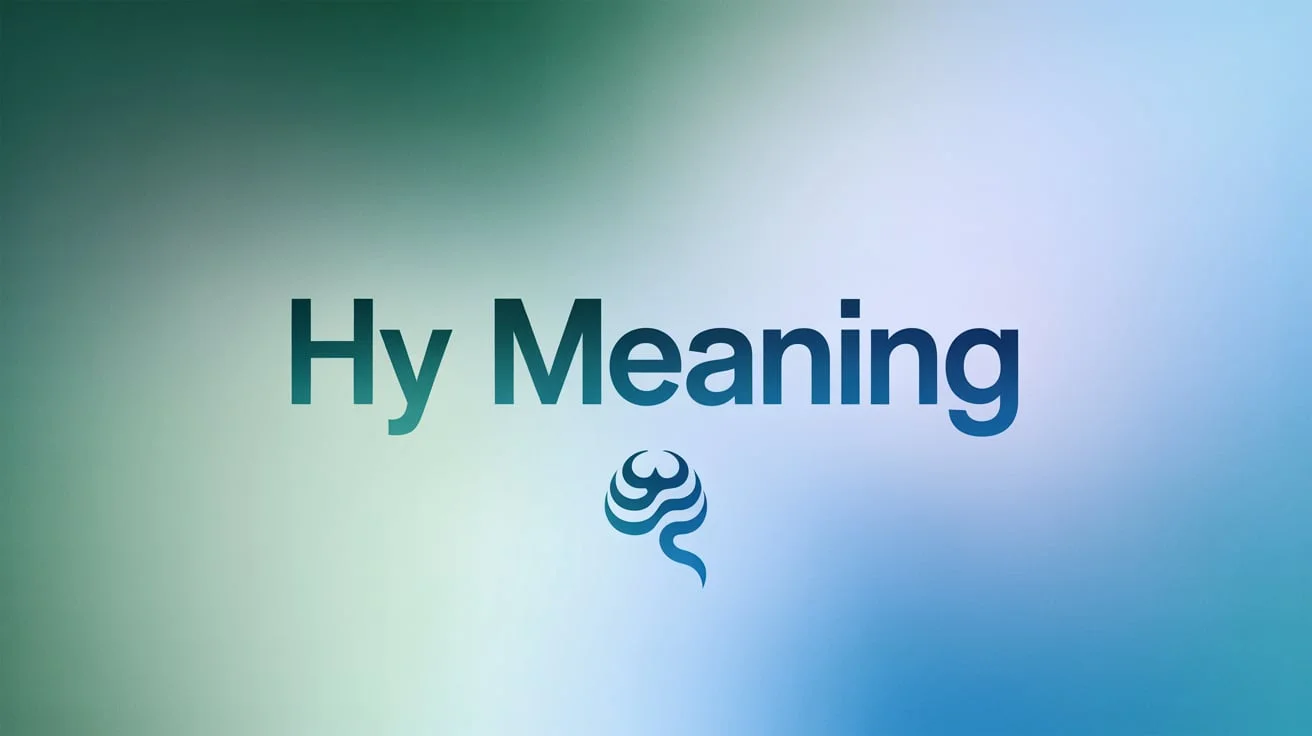When you stumble over “HY” in a chat, post, or comment, you might wonder: What’s going on here? In this post, we’ll dig deep into HY meaning, explore how people use it, and share smarter alternatives you can use instead of “hiatus.”
Let’s dive in.
You’re scrolling through a Discord server or Instagram comments and suddenly someone types “HY”. A blink earlier they were active; now, MIA. What does it mean?
“HY” has quietly become shorthand for “hiatus,” especially in digital spaces where brevity rules. But it doesn’t always mean the same thing in every setting.
This article explores the meaning of HY, shows real-world usage, highlights the risks, and offers alternative ways to express a pause or break. Whether you’re new to online lingo or just curious, stick around — this is your guide to decoding “HY.”
HY Meaning: Core Definition and Context
Primary Interpretation: “Hiatus”
At its core, HY means “hiatus”—a pause, break, or temporary stop. When someone says “going HY,” they usually indicate they’ll step away for a while but plan to return.
This is the dominant interpretation across social media, chat groups, and online communities.
Alternate Meanings / Misinterpretations
Because “HY” is short and context-light, people sometimes misread or assign different meanings. A few possibilities:
- “Hey/Hi You” — though rare, some might think it’s a greeting.
- Initials or shorthand — In a niche group, “HY” could stand for something entirely different (like a project name).
- Typo or autocorrect — Someone aiming for “hi” or “hey” might accidentally type “HY.”
Context matters. Always look at the surrounding conversation and platform before assuming “HY = hiatus.”
Why Context Determines Meaning
- Capitalization: “HY” in all caps suggests abbreviation. “Hy” or “hy” may not.
- Setting: In a fandom forum or content creation group, “HY” is more likely to mean “hiatus.” In a general social chat, it might just be shorthand.
- Audience: If your friends or community already use “HY,” they’ll catch your meaning. Otherwise, you may need to clarify.
Origins and Spread of “HY”
When Did “HY” First Appear?
Tracing the exact origin is tough. But examples show “HY” appearing in fandom and content-creator circles around the late 2010s. It likely emerged as creators wanted a quick, universal shorthand to announce breaks in their posting schedule.
Platforms Where “HY” Is Common
- Fanfiction and writing communities (Tumblr, Archive of Our Own)
- YouTube / Content creators’ updates
- Discord servers / Slack groups
- Twitter, Instagram captions / stories
Because these spaces value frequent updates and rapid communication, “HY” spread rapidly.
Why “HY” Gained Traction
- Brevity: It’s just two letters — easy to type
- Ambiguity: It signals a pause without specifying duration
- Community shorthand: Once a few people use it, others adopt it
- Neutrality: It doesn’t sound dramatic or final (unlike “goodbye” or “farewell”)
How “HY” Is Used in Real Conversation
Let’s see concrete examples and contexts to understand how people use “HY” effectively (or ineffectively).
Real Use Examples
“Hey guys, going HY for a bit. Back in a month.”
“Just FYI: HY started. Catch you all later.”
“No worries — she’s HY, so don’t expect replies for a while.”
These show signal + optional explanation. The explanation helps clarity.
Situations / Use Cases
| Situation | Example Usage | Meaning / Implication |
| Project pause | “The series is on HY.” | The series won’t continue for now |
| Social media break | “I’m going HY from posting for a week.” | Temporary absence from activity |
| Mental health or rest | “Need to HY for self-care.” | Stepping back for personal reasons |
| Forum / server absence | “I’m HY — see you when I return.” | Absence from group discussion |
Tone & Implication
- Neutral / casual: “HY” can be straightforward — neither dramatic nor emotional.
- Friendly / gentle: If paired with explanation, it’s considerate.
- Vague / mysterious: Without context, it may feel noncommittal or unsettling to others.
The tone can shift dramatically based on how you frame “HY.”
Benefits, Risks & Miscommunications
Why You Might Use “HY”
- You want a quick way to signal a break.
- You want to leave the door open — not “goodbye.”
- You expect your audience or group will understand shorthand.
- You need flexibility: you don’t want to commit to a timeframe.
Risks & Pitfalls
- Misunderstanding: Some may not know what “HY” means and ignore or ask repeatedly.
- Too vague: Without timeframe, people may worry or assume the worst.
- Perceived flakiness: If overused, it might look like you disappear often.
- Drama-sticker: In some groups, “HY” might sound like a dramatic announcemnt.
How to Reduce Ambiguity
- Always pair “HY” with a timeframe: “Back in a week,” “see you in two months.”
- Add a brief reason: “Taking time to focus on work, going HY.”
- Use tone cues: emojis, punctuation — “HY :)” is softer than “HY.”
- Clarify on return: say “Back now — thanks for waiting!”
Alternatives to “Hiatus” / Shorthand Options
Sometimes “HY” isn’t ideal. Here are better (or complementary) options you can use.
Full-Word Alternatives
- Break — simple, clear
- Pause — suggests temporary, but could be short
- Timeout — informal, casual
- Sabbatical — more formal, implies a substantial break
- Hiatus — full word, unambiguous
Other Abbreviations / Shorthand
- BRB (“Be Right Back”) — for short interruptions
- AFK (“Away From Keyboard”) — also short-term
- Offline — hints at stepping away
- On hold — suggests delay, not permanent
Choosing the Right Alternative
| Context | Best Option | Why |
| Social chat | BRB / AFK | Implies short break |
| Content creator / long-term absence | “Break,” “Pause,” or “Sabbatical” | More engaging / descriptive |
| Professional setting | “Pause,” “Temporary leave” | Clear and less slangy |
| Mixed audience | Use full word | Avoids confusion |
When (and When Not) to Use “HY”
Use “HY” When
- You’re in a casual or online-native community.
- Your audience already understands the shorthand.
- You want flexibility and don’t want to overcommit.
- You plan to return and want a middle ground between “I’m gone” and “I’ll be back.”
Avoid “HY” When
- You’re talking to an audience unfamiliar with internet lingo (e.g. formal clients).
- Precision matters — when they need to know exactly when you’ll return.
- The medium is formal: business emails, public statements.
- You fear misinterpretation or want no ambiguity.
Read More: Your Topics | Multiple Stories Strategy 2025
Tips to Use “HY” Effectively
Here are actionable tips to make “HY” work for you instead of causing confusion.
- Always include a timeframe — “Back in two weeks” or “See you Friday.”
- Add a brief reason — “Going HY to finish my novel,” “I need rest.”
- Provide updates — On return, tell everyone “I’m off HY.”
- Use tone cues — “HY :)” or “HY — catch you soon.”
- Test it on small groups first — If some say “what’s HY?”, you know clarity is needed.
- Don’t abuse it — If you go HY too often, people may stop trusting it.
FAQs & Common Questions
Is “HY” the same as “break”?
They’re similar but not identical. “Break” implies a clear pause; “HY” is shorthand for “hiatus” and often means a longer, softer break.
How long should a hiatus last?
There’s no fixed rule. It can be days, weeks, months — whichever matches your need. The key is to communicate it.
What if someone uses “HY” and never returns?
That’s possible. Always treat it like a signal, not a guarantee. If someone doesn’t come back, ask or assume they moved on.
Can I use “HY” in emails or public statements?
Better avoid it there. In formal settings, use full phrases: “I’m taking a temporary break,” “I’ll be on hiatus.”
Case Studies
Case Study 1: Content Creator “SkyWrites”
SkyWrites, a webcomic author, announced in their Discord:
“Guys, going HY for a month. Back on the 1st.”
The community understood immediately because SkyWrites had used “HY” before. The clarity of the date prevented confusion. When they returned, they posted:
“I’m off HY — thanks for waiting!”
Result: No speculation, no backlash, readers stayed engaged.
Case Study 2: Gaming Community Moderator
A moderator in a gaming server said:
“I’ll be HY.”
But didn’t add timeframe or explanation. Some users freaked: “Why? When will you be back?” Others assumed worst: “Did they quit?”
Later, the mod clarified:
“HY = offline for two weeks. Just needed a mental reset.”
Lesson: Always add context.
Summary & Takeaways
- HY meaning is shorthand for hiatus, used to signal a temporary break.
- It’s gained popularity in digital communities because of its brevity and flexibility.
- Without context, “HY” can confuse or seem vague.
- Use timeframes, short reasons, and tone cues to make “HY” clear.
- In formal settings or with mixed audiences, opt for “break,” “pause,” or “temporary leave.”
- Don’t overuse “HY” — people will grow weary or take it lightly.
- When in doubt, clarity beats shorthand.

The creative soul behind the scenes at PunnyPeeks, Emma Brooke is a curator of charm, color, and celebration. With a love for design and a knack for playful storytelling, Emma brings every event to life with custom balloon decor that speaks louder than words. Her mission? To turn simple moments into joyful memories—full of flair, laughter, and a touch of pun-loving magic.




